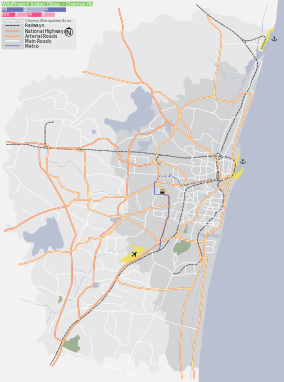Valasaravakkam
| Valasaravakkam வளசரவாக்கம் | |
|---|---|
| suburb | |
 Valasaravakkam  Valasaravakkam  Valasaravakkam | |
| Coordinates: 13°02′38″N 80°10′21″E / 13.04394°N 80.17251°ECoordinates: 13°02′38″N 80°10′21″E / 13.04394°N 80.17251°E | |
| Country | India |
| State | Tamil Nadu |
| District | Thiruvallur |
| Maduravoyal Taluk ′ | Chennai |
| Area | |
| • Total | 2.97 km2 (1.15 sq mi) |
| Population (2011) | |
| • Total | 47,378 |
| • Density | 16,000/km2 (41,000/sq mi) |
| Languages | |
| • Official | Tamil |
| Time zone | IST (UTC+5:30) |
| PIN | 600 087 |
| Vehicle registration | TN-10 |
Valasaravakkam is a municipality in the Thiruvallur district of the Indian state of Tamil Nadu and a residential suburb of the city of Chennai. It is located in the Poonamallee Taluk at a distance of approximately 15 kilometres from the heart of Chennai city. Valasaravakkam lies on the Arcot Road, one of Chennai's arterial roads. It is under the Maduravoyal election constituency. In October, 2011 Valasaravakkam Municipality ceased to exist and the area became part of Chennai Corporation as Ward Nos 149 and 152 (Zone XI), Southern Region, Corporation of Chennai. As of 2011, the town had a population of 47,378.
History
The first planned residential colonies in Valasaravakkam made their appearance during the Second World War. Prior to the war, Valasaravakkam was a small village forming a part of the Saidapet taluk of Chingleput district. Due to its remoteness, development took place at a slow pace until the 1980s. Its strategic location on the Arcot Road has resulted in accelerated growth since then.
Demographics
| Historical population | ||
|---|---|---|
| Year | Pop. | ±% |
| 1981 | 7,578 | — |
| 1991 | 21,953 | +189.7% |
| 2001 | 30,978 | +41.1% |
| 2011 | 47,378 | +52.9% |
Sources:
| ||
According to 2011 census, Valasaravakkam had a population of 47,378 with a sex-ratio of 1,004 females for every 1,000 males, much above the national average of 929.[2] A total of 4,696 were under the age of six, constituting 2,439 males and 2,257 females. Scheduled Castes and Scheduled Tribes accounted for 7.01% and .09% of the population respectively. The average literacy of the town was 86.39%, compared to the national average of 72.99%.[2] The town had a total of 12,278 households. There were a total of 18,485 workers, comprising 117 cultivators, 75 main agricultural labourers, 338 in household industries, 16,379 other workers, 1,576 marginal workers, 29 marginal cultivators, 14 marginal agricultural labourers, 58 marginal workers in household industries and 1,475 other marginal workers.[1] As per the religious census of 2011, Valasaravakkam had 90.12% Hindus, 3.42% Muslims, 5.79% Christians, 0.05% Sikhs, 0.01% Buddhists, 0.17% Jains, 0.44% following other religions and 0.0% following no religion or did not indicate any religious preference.[3]
Infrastructure
BBCL and Purvankara have developed major residential projects in Valasaravakkam. There are also big apartments (with around 10 storeys) coming up near the main road (ie) the Arcot Road. The region has good sewage and road infrastructure. The region has its own neighbourhood newspaper called Valasai Times and Arcot Road Times. A film called 'Veedu' was based on Valasaravakkam.
Places of worship
The Velveeswarar Shivan temple is a very famous temple here. The Venkatesa Perumal Temple is located in Devi Kuppam Road. Arulmigu Lakshmi Vinayagar Anjenayar Temple is in Kamakodi Nagar. Sri Dharmasastha Temple in Alwarthiru Nagar.
References
- 1 2 "Census Info 2011 Final population totals - Valasaravakkam". Office of The Registrar General and Census Commissioner, Ministry of Home Affairs, Government of India. 2013. Retrieved 26 January 2014.
- 1 2 "Census Info 2011 Final population totals". Office of The Registrar General and Census Commissioner, Ministry of Home Affairs, Government of India. 2013. Retrieved 26 January 2014.
- ↑ "Population By Religious Community - Tamil Nadu" (XLS). Office of The Registrar General and Census Commissioner, Ministry of Home Affairs, Government of India. 2011. Retrieved 13 September 2015.